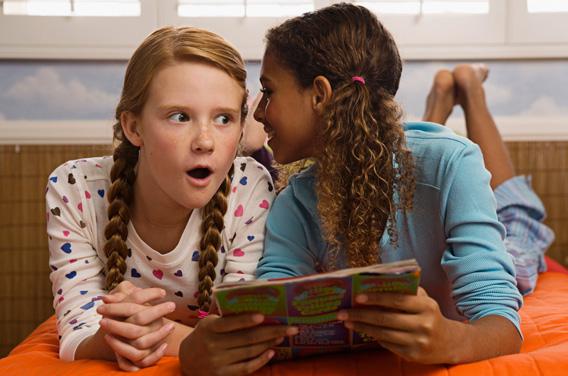After Emily Bazelon’s new book about bullying, Sticks and Stones, came out last month, Double X wondered what it was like to be on the giving end of schoolyard torture. Do bullies know that they’re bullies? Do they regret their actions in hindsight? Can they change? We published a confession by Carly Pifer, “I Was A Mean Girl,” and asked readers to submit their own stories of cruelty and (perhaps) redemption. The series runs this week. Entry No. 1 is printed below.
When I think back to Grade 7, most things are a haze. I had just started at a new school and I was well into my awkward stage. It was more than 10 years ago and my memories have since blurred into a combination of desks, color-coded notes and the new uniforms that I had to wear, but I remember one thing clearly. That year, I became a mean girl.
We’re not talking the typical Regina George-style bully either. I was my very own brand of villain.
In my tween years, I was not popular crew material. My hair was pulled tight, my front teeth jutted out like the bow of a canoe, and my eyebrows resembled two fuzzy caterpillars inching their way back together.
My new school had uniforms, but it was still easy to separate the cool kids from the rest. I was convinced that if I could become friends with the girls who seemed to effortlessly glide through middle school, everything would be better. I would get prettier, smarter, happier, and even the food would taste better. I just needed to figure out how to get there.
Ironically, I figured it out in drama class. The teacher was doing her introductions and I interrupted with a smart-ass comment mocking something she said. The class burst into giggles and minutes later, the girls with the perfectly straightened hair asked me to be in their project group. By the final bell, I was in the car with my new besties, headed to one of their houses for a sleepover. I was in. That was when I figured it out; being mean could make me popular.
As a twiggy tween, it was easy for me to pick on people who were bigger than me. One day I happened to be around when one of the less popular, slightly larger students stepped onto the scale after gym class. By the end of the day, the entire school knew her weight.
On another occasion, I used beach-day photos from a class trip to publicize which bikini-clad classmates had the biggest fat rolls.
It wasn’t always about weight either. A girl in our grade had holes in her shoes, which inspired my crew to name her “hobo.” We later stole her duct-taped footwear and hid them behind the lockers, leaving her shoeless for the rest of the school day.
The “jokes” kept rolling in and as long as the right people were laughing, I considered my performance a success.
But getting in was only the beginning; staying in was a full-time endeavor. The higher I climbed on the social ladder, the more unstable my footing became. Often, I received the same mockery, judgment and subtle bullying that I was dishing out. Some days I was in and I would go home happy. Other days, I cried myself to sleep.
After two years, I was exhausted. My private school classes were small to begin with and I had made my social circle even smaller. Between the popular girls and whoever was the flavor of the week, I was only talking to about an eighth of my grade – and by high school, that just wasn’t enough.
It was time for another change.
I had become a mean girl in middle school, so why couldn’t I become a decent human being in high school? Rather than trying to stay within the rungs of the social ladder, I hopped off all together and started seeing everyone on the same level. What I found were the classmates and soon-to-be close friends that I had overlooked.
Though I was once a mean girl, and that will always be a part of me, I also found the means to change.
